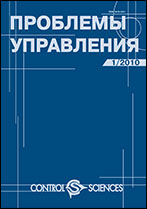|
This article is cited in 1 scientific paper (total in 1 paper)
Control in the socio-economic systems
A mathematical formulation of control problems on cognitive models
O. I. Gorbaneva, A. D. Murzin, G. A. Ougolnitsky
Southern Federal University, Rostov-on-Don, Russia
Abstract:
This paper considers cognitive modeling methods under different types of control. Relevant publications are briefly surveyed. The cognitive model is formally described as a simulation model based on a directed graph (signed or weighted digraph). Mathematical formulations of the optimal, conflict, and hierarchical control problems are proposed for cognitive models in the case of pulse processes and in the general case as well. The methodology is applied to the predator-prey model and the aggregative model of a national economy. The methodological assumptions are detailed for another control problem on a cognitive map (the optimal management of a university). In this model, a university determines the number of commercial places and the price of commercial education. The model is identified on real data for the three largest universities of the Rostov region (the Russian Federation). Some conclusions and recommendations are formulated based on model analysis.
Keywords:
control problems, discrete dynamic models, cognitive modeling, control in social and economic systems.
Received: 08.08.2022
Revised: 15.11.2022
Accepted: 15.11.2022
Citation:
O. I. Gorbaneva, A. D. Murzin, G. A. Ougolnitsky, “A mathematical formulation of control problems on cognitive models”, Probl. Upr., 2022, no. 5, 25–39; Control Sciences, 2022, no. 5, 21–33
Linking options:
https://www.mathnet.ru/eng/pu1290 https://www.mathnet.ru/eng/pu/v5/p25
|

| Statistics & downloads: |
| Abstract page: | 114 | | Russian version PDF: | 38 | | English version PDF: | 34 | | References: | 23 |
|




 Contact us:
Contact us: Terms of Use
Terms of Use
 Registration to the website
Registration to the website Logotypes
Logotypes









 Citation in format
Citation in format 